
Why Bad Bunny Is Skipping the U.S. on His Latest Tour: Trump and ICE Play a Role
In an interview with i-D, the Puerto Rican star admitted that U.S. immigration enforcement weighed heavily on his mind
Bad Bunny, the Puerto Rican megastar who has redefined the global music industry over the past decade, is currently on one of the most anticipated tours of 2025. With his latest project, Debí Tirar Más Fotos, he is filling arenas across Latin America, Europe, Asia, and beyond. Yet one glaring omission from his itinerary has left many fans disappointed: the United States.
For months, speculation surrounded this absence. In June 2025, the artist downplayed concerns in an interview with Variety, explaining that it was simply “not necessary” to include the U.S. this time around. After all, he had already spent years touring extensively across American stadiums and arenas. From El Último Tour del Mundo (2022) to the World’s Hottest Tour (2022) and the Most Wanted Tour (2024), Benito Antonio Martínez Ocasio sold out legendary venues like Yankee Stadium, SoFi Stadium, and arenas from Miami to Chicago. By 2024, he had performed more than 30 shows in the country, consolidating his dominance in the U.S. market and generating record-breaking revenues.
That explanation seemed reasonable: Bad Bunny had given U.S. fans more opportunities than almost any other artist in recent memory. Instead of repeating the same formula, he wanted to expand into new territories and focus on Puerto Rico, where his residency No Me Quiero Ir De Aquí brought in an estimated $200 million for the island’s economy.
But recently, in September 2025, the superstar revealed a deeper, more troubling motivation behind his decision: fear of ICE raids.
In an interview with i-D, Bad Bunny admitted that Donald Trump’s immigration enforcement in the United States weighed heavily on his mind. “It was something we talked about a lot, and it worried us,” he explained. The artist pointed to the indiscriminate raids being carried out by Immigration and Customs Enforcement (ICE), which have disproportionately targeted Latino communities. “The problem was that ICE could be outside [the concert],” he said, acknowledging that the risk was too high—not just for himself, but for his fans.
This revelation reframes his decision as not only artistic but also political and humanitarian. By skipping U.S. shows, Bad Bunny is taking a stand in solidarity with the Latino immigrant population that has long formed the backbone of his fan base.
Puerto Rico as a Safe Haven
Bad Bunny’s Puerto Rican residency was symbolic on multiple levels. The concerts, limited at first to island residents, were both a love letter to his homeland and a way to shield fans from the dangers they might face attending a show on the mainland. As a U.S. territory, Puerto Rico has a complex status: its people are U.S. citizens, but they are spared the constant presence of ICE operations that terrorize Latino neighborhoods in places like Texas, California, and Florida.
By centralizing his tour launch in San Juan, Benito effectively told fans: Come to me, on my terms, in a place where you’ll be safe and celebrated. For the diaspora, this became both a pilgrimage and an act of cultural resistance.
A Wider Crisis for Latin Music in the U.S.
Bad Bunny’s concerns are not unfounded. Under the renewed Trump-era immigration policies, the music industry has already felt ripple effects. Visa delays, fee hikes, and stricter regulations have forced the cancellation of Latin festivals like Chicago’s Michelada Fest and limited appearances by international stars. More critically, fear of deportation has depressed ticket sales among immigrant-heavy audiences, as fans avoid public gatherings where they might be exposed to enforcement, Billboard reported.
Artists such as Shakira, Maná, and Ángela Aguilar have spoken out about this chilling effect. Regional Mexican musicians have reported sharp declines in attendance, with many fans too afraid to attend concerts. What was once a thriving cultural scene is now under threat—making Bad Bunny’s withdrawal from the U.S. stage even more poignant.
For the biggest Latin artist in the world to skip the U.S. is not just a business choice. It’s a statement about belonging, safety, and dignity. Benito has already proven his ability to conquer American arenas and dominate charts. Now, he is choosing to prioritize Puerto Rico and the global south, while signaling that the U.S. is not a safe space for the very communities that elevated him to superstardom.
In doing so, Bad Bunny turns absence into protest. His silence on ‘American’ stages speaks louder than any sold-out show could: until Latino fans can sing freely without fear of persecution, there will be no party in the U.S.